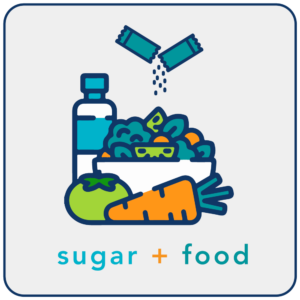What Affects Your Blood Glucose? Part 1 of 4: Food
The health journey you are on that landed you here and lead to you finding this article has likely taught you that too much blood glucose is bad. You’ve likely begun to learn that too much insulin is bad as well. But do you know why? First of all, what is glucose?
It is a simple sugar molecule that your body uses as a source of fuel. Sounds pretty innocuous, right? Beneficial even! Your body needs fuel to function, right? Yes, your body needs fuel to function, but glucose isn’t the only fuel available to your body (you will learn more about that later) and when glucose levels get too high it causes problems.The average metabolically healthy adult has between 5-7 grams of glucose floating around in their blood in a fasted state. For reference, that is about a teaspoon! A can of Coke has 39 grams! When blood sugar reaches above that level, your body will send a signal letting the appropriate gland, in this case the pancreas to secrete insulin in order to do something with it. It is either burned for energy or converted and stored.

So why is too much blood glucose bad? Because chronically high blood sugar can cause weight gain due to the fact that you are always storing the excess and eventually that is stored as fat. It increases inflammation in the body which can be manifested in a myriad of ways. It also handicaps your immune system and depletes important minerals like magnesium, leading to further downstream disturbances. These are just a few, but chronically high blood sugar over time wreaks havoc and we think it’s at the root of common chronic diseases today like heart disease and even cancer. The problem is that for the average person this often goes unnoticed because it takes a long time for fasting blood glucose to be high enough to be diagnosed as a real problem. We believe that fasting insulin is an earlier warning sign. Remember where blood glucose goes, insulin goes. For years Insulin will be doing its job, clearing glucose that is too high out of the blood, until it doesn’t and insulin resistance sets in. So, high levels of insulin in the blood tells us that it is working overtime and could be indicative of a problem.
OK, so what affects glucose? What makes it go up or down? The 4 big factors that influence blood sugar levels are what you eat, exercise/movement, stress and sleep. There are other factors as well but for our purposes those are 4 big ones more or less within your control.
In terms of what you eat, the biggest dietary factor is refined carbohydrates. Hands down, not even close. When we refer to refined carbohydrates we are referring to processed foods of the sweet and starchy variety. Think candy, ice cream and frozen desserts, cookies,cakes, muffins and baked goods generally including bread. We also mean processed snack foods like chips, crackers, pretzels, popcorn….yes even popcorn. Any time you eat you will notice a rise in blood glucose. It isn’t the fact that it rises that is the issue. It is the steepness of that rise and how long it stays elevated that is the issue. Processed carbohydrates cause the steepest rise by far. If you are working with Simplex you will learn more about that when you talk to your dietitian.
You will learn more about how exercise, stress and sleep impact blood sugar a little later as you progress through this article series. But for now we want you to pay close attention to how your food affects your blood sugar. This is the first step in getting you closer to your goal and closer to healthy glucose and insulin levels.



